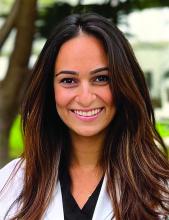She watched her father suffer from the complications of Crohn’s disease and her brother struggle with irritable bowel syndrome. “We always needed to know where the nearest bathroom was. I grew up with that around me, and I was always just fascinated by the gut and the digestive system,” said Dr. Haghighat, who just finished up her fellowship at the University of Miami and is now a gastroenterologist at University of California, Los Angeles. She also serves as social media editor for AGA’s Gastro Hep Advances.
As she got to know the personalities of the GI department in the first year of medical school, “I realized that our senses of humor and personalities kind of aligned, and I was like, ‘Oh yeah, this is where I’m supposed to be,’ ” said Dr. Haghighat, who can be found on X @DoctorShida.
Humor is something Dr. Haghighat has reached for throughout her life and career. She eventually channeled her gift for satire onto the stage and the internet, as a stand-up comedian. In an interview with GI & Hepatology News, she spoke about the connection between GI medicine and humor, and the creative ways she has helped promote cancer screening in underserved populations.
Q: What practice challenges have you faced in your career?
Dr. Haghighat: I trained in a county hospital, so I’ve always worked with underserved and vulnerable populations. One of the challenges has been just navigation of care, especially as it pertains to cancer diagnoses or cancer screening. A lot of the time, patients don’t understand why they have to do a test or something invasive like a colonoscopy for symptoms they don’t have.
Q: A focus of yours has been improving uptake of screening in underserved communities. Please talk about the work you’ve done in this area.
Dr. Haghighat: I was at Los Angeles General Medical Center — a county hospital in Los Angeles — for residency, where we treated underserved, uninsured patients. I noticed in our primary care clinics a very low uptake of colon cancer screening. Patients didn’t want to bring the stool tests back or get colonoscopies. I surveyed a bunch of the patients and asked: How can we make colon cancer screening easier for you? About a third of the patients said, “If I can do it in the clinic before I go home, that would be great.”
So, I started this initiative called “Go Before You Go.” We would ask patients, “Hey, do you need to go to the bathroom right now, if you can?” Our nurses handed them the stool test to do in the bathroom before they left the clinic after their doctor visits.
We saw really good results with that. Surprisingly, a lot of people can go on demand. We saw increased screening rates, and that quality improvement project went on to win multiple first place awards in research competitions. So that’s what got me interested, and that’s where I had my beginnings of increasing preventative services in underserved communities on the ground.



